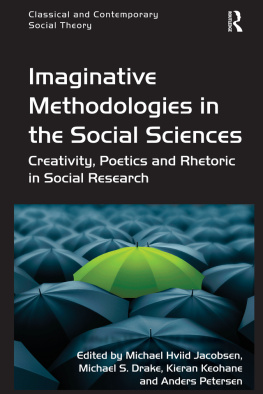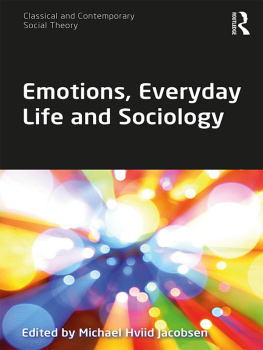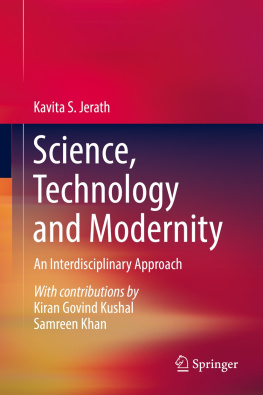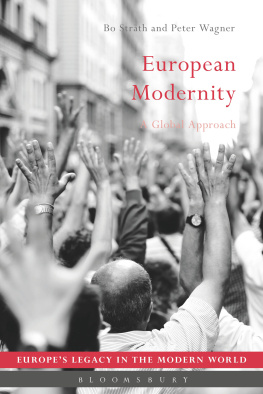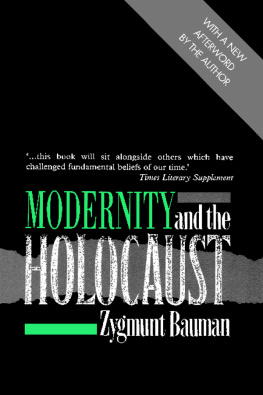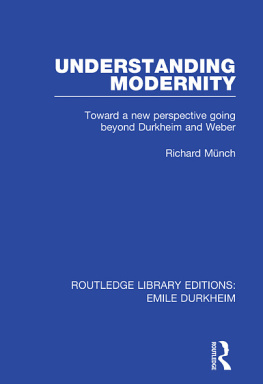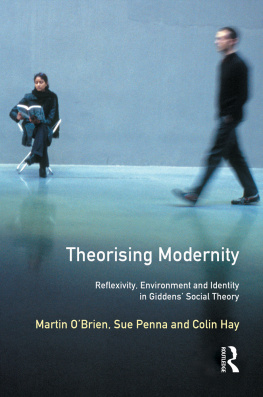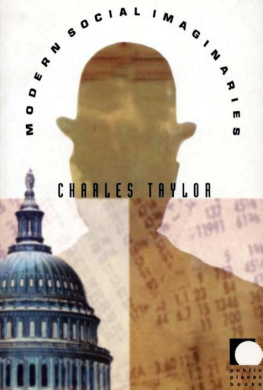THE TRANSFORMATION OF MODERNITY
The Transformation of Modernity
Aspects of the past, present and future of an era
Edited by
MIKAEL CARLEHEDEN
rebro University, Sweden
MICHAEL HVIID JACOBSEN
University of Aalborg, Denmark
First published 2001 by Ashgate Publishing
Reissued 2018 by Routledge
2 Park Square, Milton Park, Abingdon, Oxon, OX14 4RN
711 Third Avenue, New York, NY 10017
Routledge is an imprint of the Taylor & Francis Group, an informa business
Copyright Mikael Carleheden and Michael Hviid Jacobsen 2001
All rights reserved. No part of this book may be reprinted or reproduced or utilised in any form or by any electronic, mechanical, or other means, now known or hereafter invented, including photocopying and recording, or in any information storage or retrieval system, without permission in writing from the publishers.
Notice:
Product or corporate names may be trademarks or registered trademarks, and are used only for identification and explanation without intent to infringe.
Publishers Note
The publisher has gone to great lengths to ensure the quality of this reprint but points out that some imperfections in the original copies may be apparent.
Disclaimer
The publisher has made every effort to trace copyright holders and welcomes correspondence from those they have been unable to contact.
A Library of Congress record exists under LC control number: 2001093279
ISBN 13: 978-1-138-70323-0 (hbk)
ISBN 13: 978-1-315-20328-7 (ebk)
List of Content
Mikael Carleheden and Michael Hviid Jacobsen
Nikolas Kompridis
Klaus Rasborg
Gorm Harste
Bo Isenberg
Mikael Carleheden
Steven Seidman
Michael Hviid Jacobsen
Catharina Juul Kristensen
Lars Dencik
Hauke Brunkhorst
Margareta Bertilsson
jvind Larsen
Throughout the genesis of this book many people have been involved and in one way or the other have contributed at various stages to its completion. We would like to extend our gratitude to the financial sponsors of the conference in which the initial versions of the chapters were presented: The Danish Social Science Research Council and The C. W. Obel Foundation. Moreover, we would like to thank the Department of Social Science and Organisation at the University of Aalborg and especially Helle Wver for her support during both the conference and during the process of producing this volume. We would also like to thank our editor at Ashgate Publishers, Katherine Hodkinson, for assisting us in our effort to share the ideas of the conference with a wider public. Finally, thanks also to Steven Sampson for helpful comments and proofreading of the manuscripts and to Inger M. Kiis for constructing the layout of the book.
rebro and Aalborg, September 2001
Mikael Carleheden and Michael Hviid Jacobsen
MIKAEL CARLEHEDEN and MICHAEL HVIID JACOBSEN
Modernity
Most contemporary social scientists and social philosophers would generally agree with Anthony Giddens claim that modernity refers to modes of social life or organisation which emerged in Europe from about the seventeenth century onwards and which subsequently became more or less worldwide in their influence (Giddens, 1990, p.1). Modernity, Giddens continues, has now not only been extended throughout the globe, but is also intensively felt in the most intimate spheres of our personal lives: (T)he intrinsic nature of modern institutions (and we should perhaps add - of cultural beliefs and values) is, he goes on, of a different kind than the traditional social orders. Furthermore, following the institutionalisation of the rule of modernity, social change continues to be more profound in scope and more rapid than in any other social epoch of our world history (Giddens, 1990, p.6). Modernity cannot rest. Many of us would probably agree with Giddens also on this point. Nor is his more substantive suggestion disputed that surveillance, capitalism, industrialism and military power should be regarded as the most typical social institutions of modernity (Giddens, 1990, p.55ff).1 But this is how far we dare to go in proclaiming a general agreement in contemporary social theory concerning the concept of modernity. However, this volume deals with a much more controversial aspect of modernity. It is about the transformation of modernity.
Transformation
Let us make use of Piotr Sztompkas (1993) distinction between changes in a social system and changes of a social system. In the first case, Sztompka talks about reproduction, in the second about transformation. This book asks whether we are currently experiencing a transformation of modernity. The question can also be formulated in the following way: Can we still today - as did the classical social theory of modernity - manage with a distinction, which basically only allows us to distinguish between the traditional and the modern? More and more studies of our times claim that this classic distinction cannot grasp the particularity of the present social situation. Some would argue that we need new concepts and theories which help us to go beyond modernity. Others, rather, talk about a transformation of social institutions and cultural beliefs and values within modernity, while a third party defends the classic distinction, claiming that it is sound enough to enable us to understand contemporary social life.2 All three approaches are discussed in the present volume. Yet these contributions should not be understood as a simple continuation of the polemic between modernists and postmodernists which occurred in the 1980s and 1990s. Rather, it is a discussion of what we have learned from this debate in a social theoretical sense.
In this volume, the conception of a transformation of modernity is dealt with from different perspectives and on different levels. The contributions have been grouped into three general topics. The first section focuses on more general or abstract historical developments, the second on changes in the intimate spheres of social life, while the third deals with global and political issues. Furthermore, knowledge presupposes distinctions and contrasts. In our case, this means that we cannot understand the present without contrasting it with the past and the future. This is especially true when the subject matter is modernity. Modernity can be viewed as a special relation seen between past, present and future. The authors in this volume all use these distinctions to make sense (or non-sense) of the conception of a transformation of modernity. This is why we have given this anthology the subtitle Aspects of the Past, Present and Future of an Era.
The contributions are revised versions of some of the papers presented at the Transformation of Modernity conference held at Hjgaarden, Denmark in autumn 1999. Participants included a wide range of international scholars from a variety of social scientific disciplines and from philosophy. The discussions during this conference were very stimulating and helped the contributors of this book to refine their arguments. Below we present the slightly revised preamble of the conference, which describes the thematic of the discussions that took place and the backdrop for the contributions in this book. We then present the key ideas of each contribution in condensed form.


